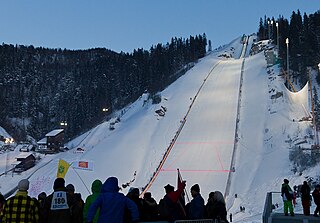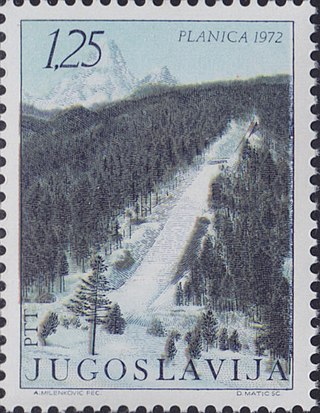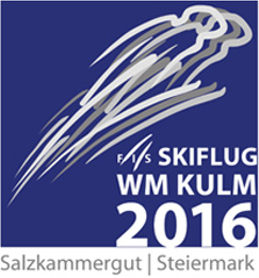
Ski jumping is a winter sport in which competitors aim to achieve the farthest jump after sliding down on their skis from a specially designed curved ramp. Along with jump length, competitor's aerial style and other factors also affect the final score. Ski jumping was first contested in Norway in the late 19th century, and later spread through Europe and North America in the early 20th century. Along with cross-country skiing, it constitutes the traditional group of Nordic skiing disciplines.

The FIS Ski Jumping World Cup is the world's highest level of ski jumping and the FIS Ski Flying World Cup as the subdivisional part of the competition. It was founded by Torbjørn Yggeseth for the 1979/80 season and organized by the International Ski Federation. Women began competing during the 2011/12 season.

Ski flying is a winter sport discipline derived from ski jumping, in which much greater distances can be achieved. It is a form of competitive individual Nordic skiing where athletes descend at high speed along a specially designed takeoff ramp using skis only; jump from the end of it with as much power as they can generate; then glide – or 'fly' – as far as possible down a steeply sloped hill; and ultimately land within a target zone in a stable manner. Points are awarded for distance and stylistic merit by five judges. Events are governed by the International Ski Federation.
Andreas Felder is an Austrian former ski jumper. During this period he dominated the sport, together with contemporaries Jens Weißflog and Matti Nykänen. He finished in the top three overall six times in the World Cup and won the 1990/91 overall. He won his first international championship medal at the 1982 FIS Nordic World Ski Championships in Oslo with a silver medal in the team large hill event.

Gregor Schlierenzauer is an Austrian former ski jumper who competed from 2006 to 2021. He is one of the most successful ski jumpers of all time, having won the Ski Jumping World Cup overall title, the Four Hills Tournament, and Nordic Tournament twice each; the Ski Flying World Cup overall title three times; as well as four medals at the Winter Olympics, twelve at the Ski Jumping World Championships, and five at the Ski Flying World Championships.

Vikersundbakken or Vikersund Hill is a ski flying hill at Vikersund in Modum, Norway. It is one of the two largest purpose-built ski flying hills in the world. Nine world records have been set there, including the current record of 253.5 meters, set by Stefan Kraft. The complex consists of a large hill, a normal hill and several training hills.
The 2007–08 FIS Ski Jumping World Cup was the 29th World Cup season in history. The season began on 1 December 2007 in Kuusamo, and finished on 16 March 2008 in Planica. The season was dominated by Austrian pair Thomas Morgenstern and Gregor Schlierenzauer who between them won 16 of the 27 individual competitions.
The 2008–09 FIS Ski Jumping World Cup was the 30th World Cup season in ski jumping and the 12th official World Cup season in ski flying. It began on 29 November 2008 at the Rukatunturi ski jumping hill in Kuusamo, Finland, and finished on 22 March 2009 at Planica, Slovenia.
The 2009–10 FIS Ski Jumping World Cup was the 31st World Cup season in ski jumping and the 13th official World Cup season in ski flying. It started on 26 November 2009 at the Rukatunturi ski jumping hill in Kuusamo, Finland and finished on 14 March 2010 at Holmenkollen, Norway.

The FIS Ski Flying World Ski Championships 1972, the first ever ski flying world championships took place on 25 March 1972 in Planica, Yugoslavia. A total of 110,000 people has gathered in three days.

The FIS Ski Flying World Championships 2012 was a World championship in ski flying, held in Vikersund, Norway, from 23 to 26 February 2012. Vikersund hosted the event previously in 1977, 1990, and 2000.

Stefan Kraft is an Austrian ski jumper. He is one of the most successful ski jumpers of all time, having won the Ski Jumping World Cup and Ski Flying World Cup overall titles two and three times respectively, the Four Hills Tournament once and Raw Air Tournament twice, and three individual gold medals at the World Championships. Since March 2017, he has held the ski flying world record of 253.5 metres (832 ft).

The 2014–15 FIS Ski Jumping World Cup was the 36th World Cup season in ski jumping for men, the 18th official World Cup season in ski flying and the 4th World Cup season for ladies. It began on 22 November 2014 and ended on 22 March 2015 in Planica, Slovenia. A break took place during the season in February for the FIS Nordic World Ski Championships 2015 in Falun, Sweden.

The 2015–16 FIS Ski Jumping World Cup was the 37th World Cup season in ski jumping for men, the 19th official World Cup season in ski flying and the 5th World Cup season for ladies. It began on 21 November 2015 in Klingenthal, Germany and concluded on 20 March 2016 in Planica, Slovenia.

The FIS Ski Flying World Championships 2016 was held between 15 and 17 January 2016 in Tauplitz/Bad Mitterndorf, Austria for the fifth time. Kulm hosted the event previously in 1975, 1986, 1996 and 2006. The individual defending champion was Severin Freund.
The 2015/16 FIS Nordic Combined World Cup was the 33rd World Cup season, organized by the International Ski Federation. It started on 4 December 2015 in Lillehammer, Norway and ended on 6 March 2016 in Schonach, Germany.

The 2016–17 FIS Ski Jumping World Cup was the 38th World Cup season in ski jumping for men, the 20th official World Cup season in ski flying and the 6th World Cup season for ladies. The season began on 26 November 2016 in Kuusamo, Finland and concluded on 26 March 2017 in Planica, Slovenia.
The 2021/22 FIS Nordic Combined World Cup, organized by the International Ski Federation was the 39th Nordic Combined World Cup season for men, and the 2nd season for women. The men's competition started in Ruka, Finland, and the women's competition in Lillehammer, Norway. Both competitions concluded in Schonach, Germany.
The 2023–24 FIS Alpine Ski World Cup, organised by the International Ski Federation (FIS) is the 58th World Cup season in alpine skiing for men and women.
The 2023–24 FIS Ski Jumping World Cup, organized by the International Ski Federation (FIS) is the 45th World Cup season in ski jumping for men, the 27th season in ski flying, and the 13th season for women.











